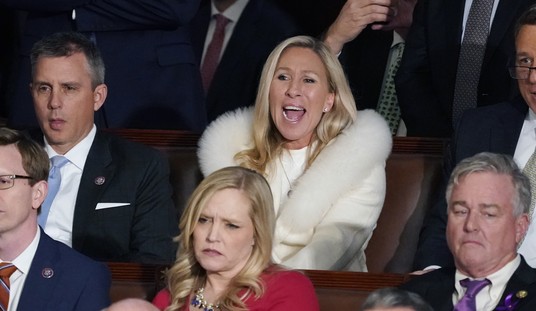In the 36 hours since Beyonce’s muzzled, splayed, headless, and otherwise sexually submissive VMA performance, we’ve seen a comedy sketch at the Emmys that somehow is a setback for feminism because it objectifies women’s bodies. Mollie Hemingway heaped plenty of scorn upon that little inconsistency. But I’m still left wondering how any feminist loved Beyonce’s performance.
Yesterday afternoon, Jessica Valenti went up at the Guardian with this gem of an observation about Beyonce’s performance. After expressing her excitement about Beyonce putting “feminist” “literally in bright lights,” she talked about celebrity popular pressure:
I’m glad that [Taylor Swift] another celebrity with mass appeal – to young women, especially – is touting a movement necessary for gender justice. But the singer-songwriter calling herself a feminist for the first time in the same week that she released a video in which she twerks and crawls through the disembodied legs of women of color shows that it takes more than identifying as a feminist to understand feminism. (Perhaps as Swift browses the feminist section of bookstores she could pick up something on racism and cultural appropriation. Maybe she could read Chimamanda Ngozi Adichie, as Beyoncé clearly has?)
I agree with Valenti that it takes more than identifying as a feminist to understand feminism. I am on record claiming that women rallying around a term about which they know little is the major problem of the movement. But Valenti’s position is that the problem with Taylor Swift’s understanding of feminism isn’t the objectifying nature of twerking, but that Swift is stealing the dance moves of women of color. Women of color are the ones who twerk. That is the essential assumption of the cultural appropriation argument. Maybe Swift isn’t the one in need of a book on racism.
Otherwise, Valenti either misses or ignores the women-as-a-piece-of-meat theme of Beyonce’s performance. So giddy is she at the idea of a cool star owning the term that she doesn’t worry about how Beyonce presents feminism: lubed up and waiting for her man to come home.*
Valenti mentions how feminism needs to be more of a fight for social justice. I see three problems with her strategy. One, she thinks change will be accomplished by filling feminist ranks with kids who want to be cool. Cultural revolutions, however, are accomplished by a few leaders with a commitment, not masses of people following the herd. What’s Occupy done lately? Or hashtag activism? Without leadership, you get a loud and short outcry with nothing to show for it.
Two, she misjudges cool.
Feminism is no longer “the f-word”, it’s the realm of cool kids: Beyoncé, Lena Dunham, Amy Poehler, Kerry Washington and Joseph Gordon-Levitt all call themselves feminists. And just this week, after years of equivocating, Taylor Swift came out as a feminist.
Surveys come out with numbers ranging from about 60–75% of respondents refusing to ID as feminists, and Valenti is excited that Joseph Gordon-Levitt claims the term?
Three, these cool stars she hopes will lead newly swollen ranks of feminist followers on to social justice? They are using what little credibility the term has to increase their own sales.
Beyonce is beautiful and selling it while she’s got it. Lena Dunham? By the ratings, Girls is a dud, held afloat only by its claims to feminism. The term is helping Lena, not the other way around. Furthermore, I think wavering latecomer Taylor Swift might be looking to the term as a boost. Based on the news coming out of her consumer products and her record sales, her popularity may have peaked. Having Swift call herself a feminist looks like professional opportunism, which won’t help the movement any more than Beyonce selling albums by singing about bondage or blow jobs.
Having Hollywood stars claim feminism won’t bolster feminism just further confuses it. Radical, pro-sex, domestic—if you tried to Venn diagram modern feminism, you’d end up with a chart that looked like a nonsensical mashup of surrealism and pointillism. It has no consistent usage, no consistent practice. It means whatever the speaker wants it to mean. Feminism isn’t just dying from waning popularity, but from a lack of meaning. And “Feminist” “literally in bright lights” won’t fix that.
*Wasn’t that a song by Sheena Easton? “My baby takes the morning train/ He works from 9 to 5 and then/ He takes another home again/ To find me waiting for him.” Writers originally called that song 9 to 5, but Dolly Parton’s hit by the same name came out about that time, so Easton’s song became “Morning Train.” Point is, we’ve been here before, selling feminism in pop music, and like most things music, the ’80s did it better. Parton’s 9 to 5 is iconic.
Beyonce should listen carefully to Easton’s “Strut.” “He said, “Honey, don’t stop this speeding train before it reaches its destination./ Lie down here beside me / You’ll have some fun too / Don’t turn away from your true vocation.” Easton’s song took the man to task for such disrespect in the bedroom. Beyonce’s songs submit.










Join the conversation as a VIP Member